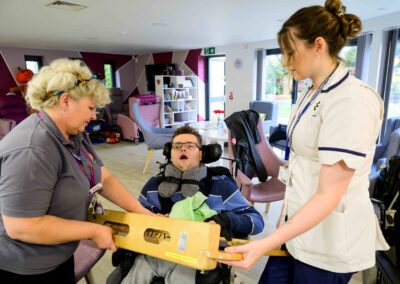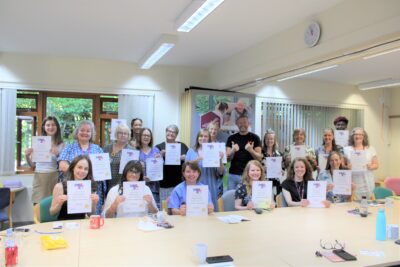Connecting care in the community
In Hospice Care Week, St Elizabeth Hospice explains how they work with other organisations to connect their patients and families with the care and support they need.
Martin Russell is a community clinical nurse specialist (community CNS) at St Elizabeth Hospice supporting patients and their families and carers at home.
It’s a very diverse role which sees him and the rest of the team working very closely with other departments within the hospice and many other health and social care professionals and organisations in the area.
As a community CNS, Martin and the team receive daily referrals from hospitals, GPs, nurse specialists and members of the public and at their daily meetings, the team decide how best to respond to each individual patients’ needs.
Around 80% of the hospice’s patients prefer to be cared for at home in the comfort of familiar surroundings and Martin and fellow staff at the hospice do everything they can to enable this to happen.
Martin said: “Being with patients in their own homes is where they feel most comfortable and where they are most likely to tell us about their hopes and fears. We have to introduce ourselves whilst in their homes and assess the patient’s state of mind about hospice care.
“We have to pick up clues from the patients and their families and work out which avenues to pursue. A community CNS must possess emotional intelligence and be prepared to constantly fine-tune their skills whilst also remembering that they are not counsellors.”
A typical day in the life of a community CNS could begin with a primary visit to a new patient for a holistic assessment which could last between one and two hours. Within that assessment the physical, spiritual, psychological and social needs will all be considered as well as an introduction to what services the hospice provides.
Later in the day, a follow-up visit to another patient in hospital or at home could take place. Medication changes can be advised in such a visit and a follow-up visit from the hospice at home team may also be arranged, if necessary.
Many follow-up contacts are made by telephone and there is plenty of administration, including typing up notes and updating spreadsheets. Diaries and rotas also need monitoring.
Each member of the team has a case-load and supports their patients through to the end of life.
Martin said: “We work closely with the hospice’s community healthcare assistants, supporting and liaising with them. The doctors, in turn, are really supportive of us, sharing their knowledge and answering questions from us when we call for advice.
“It is difficult when you first start as a community CNS as you can doubt yourself and worry about not picking up something important.
“It is a big learning curve, recognising when to ask for a doctor’s help because we naturally want to be able to provide solutions immediately when we are with a patient in their own home.”
A key part of the role is being able to read situations and tuning into the relationships which exist within the families they visit. They ensure that the patient’s loved-ones are also looked after by providing reassurance as well as recognising the limits of what families, carers and friends need to know.
“It takes honesty to find those limits and know how far to go. We use straight-forward language with people so that our advice and help is as clear as possible.”
Martin explains that another significant aspect to his role is working with nursing and residential homes. His team provides support to nurses and carers of patients with learning disabilities and who are in supported living accommodation.
“Part of our role is to give some training on the job, to share experience and knowledge with other healthcare professionals such as in local care homes.”
Each community CNS takes a turn in doing a duty shift where they deal with internal and external queries. In addition, team members can opt to gain further experience by spending five months working on the inpatient unit as a junior sister before returning to their community CNS role. This way, they are able to see both sides of the care provision and gain further professional development.
“I have been in this role for four months now, having spent a year teaching on the inpatient unit; three years teaching about palliative care and six years nursing on the inpatient unit. It remains really important to keep updating both hard and soft skills.”
Despite having a tough workload, Martin loves working as a CNS: “I absolutely love my job. There is a good mix of experience in the community CNS team. The best part of it is making end of life as good as possible for all concerned.
“It is a privilege to hear all the positive feedback we receive and to know that we make a real difference.”
The hospice’s community healthcare assistants (CHCA’s) work alongside the community CNS team, hospice at home team, and the inpatient unit to provide care for patients at home.
Their role is vital, and their reputation precedes, them, but it’s not a service that is well-known to the public.
They support discharge from the hospice or hospital to support patients who are living at home who have a sudden increase in care needs, until a permanent care package can be arranged.
They may not have contact with a patient and their family for long, but they often make a lasting impression.
Cathy Miles is one of the eight community healthcare assistants working to make sure patients are able to return to their homes and stay there if that is their wish.
Cathy said: “Our role is really important to keep people at home with their loved-ones. It is a really intimate time so it is an honour and a privilege to support people at such a time.”
What began as an 18 month project has now been running for nine years and is a vital part of St Elizabeth Hospice’s services.
“Referrals come in all the time from doctors, the inpatient unit, the hospital and the hospice at home team. These all have to be distributed amongst our team as they happen, and things can change overnight.”
Once connected with a patient, the community healthcare assistant will generally provide a maximum of four weeks’ care before handing over to another care provider, unless the patient is very close to the end of their life, in which case, the CHCAs will continue caring for as long as is required.
“We liaise with care agencies and live-in carers, then with a variety of departments within the hospice team, including: complementary therapists; emotional wellbeing team; OneCall and hospice at home in particular for advice and medication needs.”
CHCAs are able to administer prescribed medication as well as help carers and family with it. They cannot prescribe it but work closely with the hospice at home nurses on this.
Cathy adds: “It can be quite daunting at times but good because we get involved with people so quickly, exchanging information, experience and advice together.”
Some patients in the community do not see anyone else from the hospice until a CHCA walks in, so their role becomes so many things in one package.
“We build up relationships with the community and have to think on our feet.”
Cathy comments on how grateful and appreciative patients and their families are of the work they do
“Recently, when I left a patient’s home, absolutely everyone in the room took the trouble to say thank you to my colleague and me individually, including the young grandson saying: ‘Thank you for looking after my nanny’.
“Essentially, we are part of our patients’ lives at that difficult and intimate time.”
The CHCA role is an essential part of the community team in which no one person can work effectively without the others; as Cathy says:
“We represent St Elizabeth Hospice in the community, our reputation must precede us. We are always assessing our patients’ needs and aiming to give the best care at a time when people most need it.”
How to connect with the hospice
St Elizabeth Hospice improves life for people living with progressive illnesses such as MND, cancer, multiple sclerosis, heart, lung and kidney disease.
The hospice provides care and support to patients, families and carers, wherever it is required, whether at home, in the community or at the hospice.
If you feel like you or a loved one could benefit from the support of St Elizabeth Hospice, get in touch.
You can self-refer online by clicking here or call 01473 727776 Monday to Friday, from 9am – 5pm.
If it’s an urgent referral, call the hospice’s 24/7 advice line, OneCall on 0800 56 70 111.
To find out more about our community teams, click here



